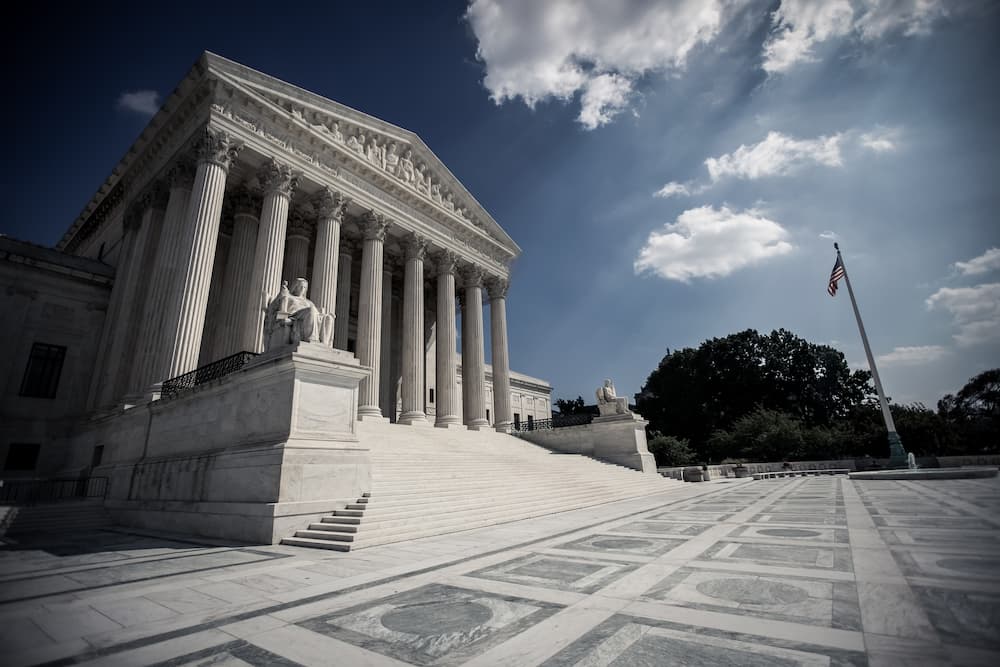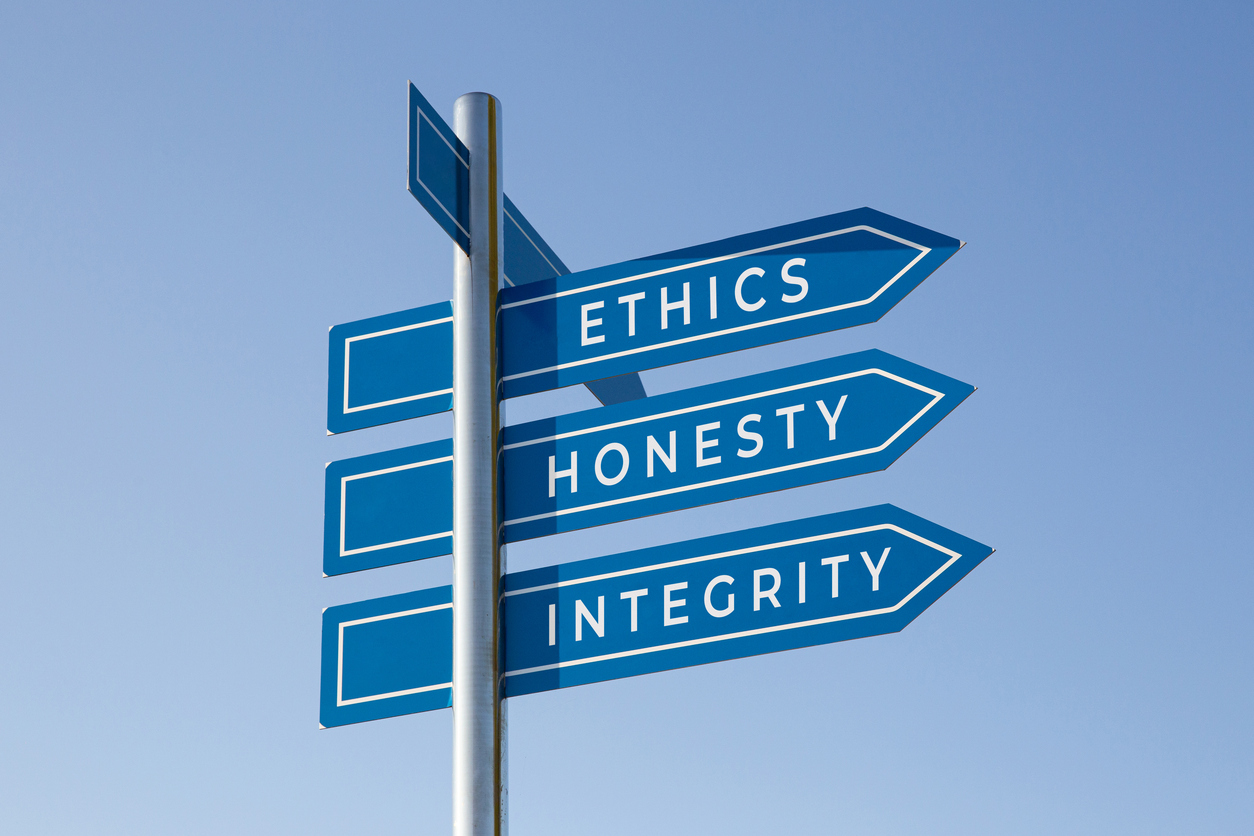Written by
Bretton Chatham
Bretton is an aPHR-certified member of the Marketing Team at Bernard Health. He writes about HR, compliance, and benefits solutions.
Supreme Court Blocks OSHA’s Vaccine Mandate

Almost a week after hearing oral arguments, on January 13, the Supreme Court of the United States blocked the Occupational Safety and Health Administration (OSHA) from implementing and enforcing its Emergency Temporary Standard (ETS) requiring large private employers to enact a vaccinate-or-test policy mitigating the spread of COVID in the workplace.
At the same time, however, the Court upheld a vaccine mandate for healthcare workers under the Centers for Medicare and Medicaid Services (CMS).
Find out more about these significant developments in federal COVID compliance.
What are the Federal Vaccine Mandates?
On September 9, in a televised address to the nation, the President outlined several sweeping actions from his administration to better control the pandemic. They included new executive orders and federal regulations to mandate COVID vaccination for large private employers (enforced through OSHA), most federal agencies and government contractors, and all healthcare providers who receive Medicare and Medicaid reimbursement (enforced through CMS), ultimately affecting about two-thirds of the workforce.
OSHA’s ETS, released on November 4, would have required private employers with 100 or more employees to implement and enforce a policy mandating COVID vaccination or weekly testing and masking for workers who remain unvaccinated.
The CMS rule, also released on November 4, requires full vaccination without a testing option for all healthcare workers employed by providers receiving Medicare and Medicaid reimbursement.
Supreme Court’s Vaccine Mandate Decisions
After several reversals from lower courts, on January 13, the Supreme Court stayed implementation and enforcement of OSHA’s ETS in a 6-3 decision. The Court’s majority opinion explains:
OSHA has never before imposed such a mandate. Nor has Congress. Indeed, although Congress has enacted significant legislation addressing the COVID–19 pandemic, it has declined to enact any measure similar to what OSHA has promulgated here.
In other words—although the Court has upheld state-level vaccine mandates in the past—it suggests that Congress has the authority here to either impose a federal vaccine mandate for private employers or to authorize Secretary of Labor Marty Walsh to impose such a rule, neither of which it has done.
The Court did, however, uphold the CMS mandate for healthcare workers in a 5-4 decision, with Chief Justice Roberts and Justice Kavanaugh switching sides to form a majority. The Court—referring to the CMS—writes:
The challenges posed by a global pandemic do not allow a federal agency to exercise power that Congress has not conferred upon it. At the same time, such unprecedented circumstances provide no grounds for limiting the exercise of authorities the agency has long been recognized to have.
In other words, the Court suggests Secretary of Health and Human Services Xavier Becerra is acting within the authority given to him by Congress.
In related news, on December 8, the US Senate narrowly voted to overturn the federal vaccine mandate—with two centrist Democrats joining Republicans. The Senate vote is largely a symbolic gesture as the Democrat-controlled House will likely not consider the bill—and even if it did, Biden would certainly veto the legislation aimed at undoing his COVID initiative.
What Else Do Employers Need to Know About the Vaccine Mandates?
Since the Supreme Court left the CMS rule in place, healthcare providers should note that extended deadlines for compliance are January 27 for workers to receive their first COVID vaccine dose and February 28 for their second.
It is also important for large private employers to note that—according to labor law firm Fisher Phillips—the Supreme Court was asked to review whether the temporary injunctions by lower courts were properly enacted, not the validity of the mandates themselves:
Technically, the Court didn’t kill the ETS for good, but the long-term prognosis is not looking good. SCOTUS reapplied the temporary injunction that once again blocks OSHA from enforcing the ETS for the time being while the parties continue to battle in lower courts over whether the emergency rule is valid.
Although the consolidated case will return to the Sixth Court of Appeals, it is unlikely that the lower court will revive the vaccine mandate for private employers.
There is also the issue of the ETS’s timeframe to consider. “OSHA’s ETS was only designed to remain in place for six months, after which it must be replaced by a permanent standard,” Fisher Phillips notes. “If [OSHA] wants to continue this fight, stay tuned for a formal rulemaking process that could see a formal regulation published on or before May 5.”
DOL Secretary Walsh said in a press release that he was “disappointed in the court’s decision,” calling it “a major setback to the health and safety of workers across the country.” He also added, “OSHA will do everything in its existing authority to hold businesses accountable for protecting workers, including under the COVID-19 National Emphasis Program and General Duty Clause.”
Employers may still implement and enforce their own corporate vaccination policy or use wellness incentives to encourage vaccination. So far, these employer-led initiatives have held up in litigation.
Additional Resources
You can stay informed, educated, and up-to-date with HR compliance and other important topics using BerniePortal’s comprehensive resources:
- BerniePortal Blog—a one-stop-shop for HR industry news
- HR Glossary—featuring the most common HR terms, acronyms, and compliance
- HR Guides—essential pillars, covering an extensive list of comprehensive HR topics
- BernieU—free online HR courses, approved for SHRM and HRCI recertification credit
- HR Party of One—our popular YouTube series and podcast, covering emerging HR trends and enduring HR topics
Written by
Bretton Chatham
Bretton is an aPHR-certified member of the Marketing Team at Bernard Health. He writes about HR, compliance, and benefits solutions.
Related Posts
Yes, you can use a health savings account, or HSA, for cosmetic surgery, but only in...
According to the KPMG 2023 CEO Outlook, 64% of business leaders believe there will be a...
Thomas J. Peters, best known for his book In Search of Excellence, once stated, “The day...
According to the Ethics and Compliance Initiative’s (ECI) 2023 Global Business Ethics...







Submit a Comment